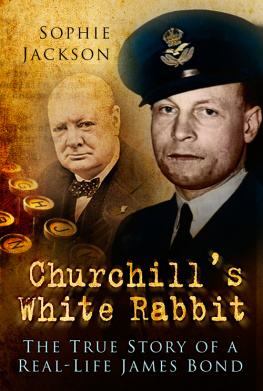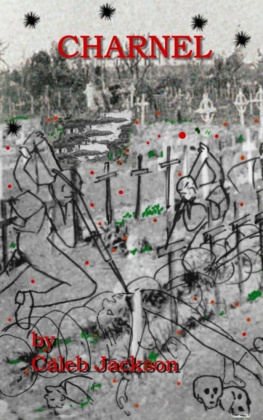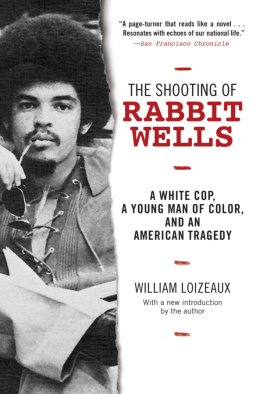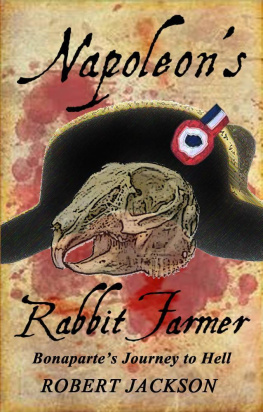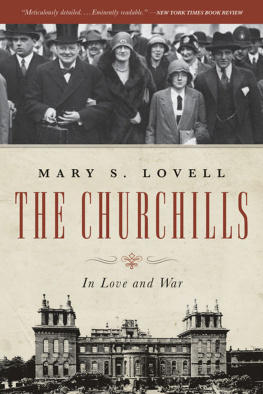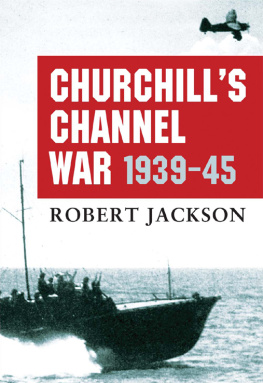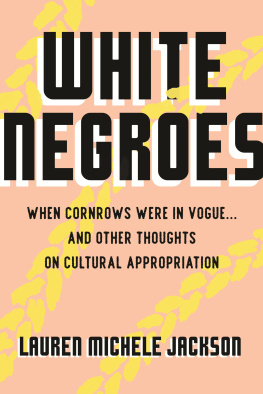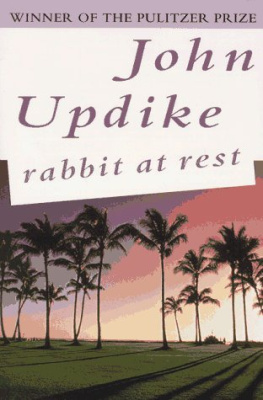Jackson - Churchills White Rabbit
Here you can read online Jackson - Churchills White Rabbit full text of the book (entire story) in english for free. Download pdf and epub, get meaning, cover and reviews about this ebook. year: 2011, publisher: The History Press, genre: Non-fiction. Description of the work, (preface) as well as reviews are available. Best literature library LitArk.com created for fans of good reading and offers a wide selection of genres:
Romance novel
Science fiction
Adventure
Detective
Science
History
Home and family
Prose
Art
Politics
Computer
Non-fiction
Religion
Business
Children
Humor
Choose a favorite category and find really read worthwhile books. Enjoy immersion in the world of imagination, feel the emotions of the characters or learn something new for yourself, make an fascinating discovery.
- Book:Churchills White Rabbit
- Author:
- Publisher:The History Press
- Genre:
- Year:2011
- Rating:5 / 5
- Favourites:Add to favourites
- Your mark:
- 100
- 1
- 2
- 3
- 4
- 5
Churchills White Rabbit: summary, description and annotation
We offer to read an annotation, description, summary or preface (depends on what the author of the book "Churchills White Rabbit" wrote himself). If you haven't found the necessary information about the book — write in the comments, we will try to find it.
Jackson: author's other books
Who wrote Churchills White Rabbit? Find out the surname, the name of the author of the book and a list of all author's works by series.
Churchills White Rabbit — read online for free the complete book (whole text) full work
Below is the text of the book, divided by pages. System saving the place of the last page read, allows you to conveniently read the book "Churchills White Rabbit" online for free, without having to search again every time where you left off. Put a bookmark, and you can go to the page where you finished reading at any time.
Font size:
Interval:
Bookmark:

TWO PREVIOUS WORKS ON Forest Yeo-Thomas have significantly helped in this revision of his history. The White Rabbit by Bruce Marshal first appeared in 1952 and is the closest that can be come to an autobiography from Forest. It suffered from Marshals rather awkward prose and heavy-handed similes and was not entirely well received.
The second work, Bravest of the Brave by Mark Seaman, appeared in 1997 and delved into Forests personal papers to give a better understanding of the man and above all followed him post-war, which Marshal failed to do.
Both works, however, were inevitably one-sided due to restrictions on official SOE papers, which meant that they had to rely on Forests own words (recorded in unpublished memoirs) or the words of those who were closest to him.
Over the last decade the National Archives have gradually released SOE documents, in particular those relating to Forests missions and his personnel file, along with other papers, which enable a greater insight into this amazing man. New research has revealed more about his closest companions, such as Henri Peulev, as well as opening doors into the Nazi regime. In particular the work of researchers to catalogue and publish the personnel files of the SS has enabled characters that Forest mentioned briefly to be fleshed out.
Among this new research was the discovery of a letter by Ian Fleming, never before published, that indicated his involvement with Forest.
This book could not have happened without the work of many others who have performed their own researches into the Second World War and published insightful accounts. It aims to take the efforts of Marshal and Seaman and build upon them to create a truly 3D image of a remarkable man. There is probably still much more to know about Forest, along with the many men and women who served with him, and only time will tell what new revelations will emerge from the archives.
IT IS MARCH 1944 in Paris. SOE agent Shelley takes the familiar steps up to Passy Mtro station ready to catch a train to Rennes. He is due to make a last contact with agent de liaison Antonin to pass on last-minute instructions and an encoded message. The Mtro station is the ideal place for a casual rendezvous. Since the Nazi occupation of 1940, cars have been virtually non-existent in Paris; aside from a ban on civilian motorists, most of the petrol stores were blown up in the invasion and what fuel is left has been secured for German use. Parisian citizens have had to fall back on other forms of transportation the bicycle has seen a tremendous surge in popularity. But longer distances require faster transport and the Mtro serves this purpose. The Nazis know that Paris cannot be brought to a standstill forever, so they ensure that the Mtro runs smoothly and frequently. As Shelley saunters into Passy station bustling crowds instantly surround him. The platform is a hub of activity, filled with all kinds of passengers, and it affords solid cover for a clandestine meeting.
For the obsessively discreet Shelley, this is the perfect meeting point. He is a stickler for security. As part of his work in France developing the various resistance movements and coordinating them with British efforts, he often infuriates his espionage colleagues by drumming into them the need for strict protocol and utmost secrecy. He has come close to capture due to the recklessness of a resistance agent more than once. Others have died at Gestapo hands and whole resistance cells have been annihilated through the carelessness of a single individual. But as he calmly heads up the Passy steps that spring morning, he is unaware that his cover has already been blown the last minutes of Shelleys freedom are numbered.
Shelley has his last day in Paris perfectly mapped out. He leaves his apartment at 9 a.m. for an 11 a.m. meeting with Antonin, then he plans to have lunch with two women Maud Bauer and Jacqueline Rameil, secretaries to journalist and resistance member Pierre Brossolette. Brossolette has recently been arrested, though the Germans are ignorant of his identity and importance. Shelley is planning a rescue mission, and his visit to Rennes, where Brossolette is in custody, is part of this operation. At lunch with the ladies, he will discuss news of Brossolette, as Maud is in close contact with the prisoner, masquerading as his mistress in order to get access to him in prison.
With his plans organised down to the last detail, Shelley is feeling confident as he arrives at the steps of the Mtro, looking forward to a brief spell away from the constant and disturbing gaze of the Paris Gestapo.
Shelley walks nonchalantly up the station steps. His meeting with Antonin will appear to be by pure chance. Antonin has been instructed to signal that the coast is clear to Shelley by having his hands in his pockets any deviation will mean that the encounter is called off. In the last few weeks Shelley has been tailed more than once, has seen ill-disguised Germans loitering outside his rooms and has even had to accost a contact who had failed to realise he had two Germans following him to a meeting. It is imperative that Antonin respects the danger they are in and acts accordingly.
Stopping by a newspaper kiosk, Shelley pretends to browse the few patriotic papers and magazines. He is uncomfortably aware that 11 a.m. is rapidly passing with no sign of Antonin. Punctuality is another part of the Shelley code a late contact is a worrying sign. With any other agent, Shelley would have argued that the meeting should be aborted there and then, but at that crucial moment he finds himself torn with indecision.
Heading down the far side of the Mtro station he pauses to consider his options: his principles tell him he should abort the contact and flee the station, but the information he is to pass to Antonin is so important that he is loath to give up so easily. Besides, he is due to be in Rennes for several days and he doesnt like the idea of leaving without passing on vital instructions. The final nail in his coffin is the over-confidence that has been growing in Shelley since his first successes in France. He has outwitted the Gestapo on several occasions with the most audacious schemes, and lost tails and taken risks with seeming impunity. Right at that moment it seems as though Shelley has luck on his side, so he turns around and walks back into the station.
Glancing up the steps there is still no sign of Antonin, but Shelley heads upstairs anyway, and back to the kiosk, his contact point. The arrival of a train, which disgorges a large party of passengers, encourages him, and the commotion seems a good mask for his own clandestine activities.
Shelley is still on the stairs when, suddenly, five men break from the new arrivals and grab him. In seconds the stunned Shelley has his hands wrenched behind his back and handcuffed, while all around him train passengers scurry past and pretend not to notice. As his captors rifle through his pockets, Shelley spots the missing Antonin being escorted away between two Gestapo men. His heart sinks as he realises his hasty decision has led him straight into a trap.
Around him the Germans are yelling at the crowd to keep moving and threaten to shoot anyone who tries to intervene. The warning is hardly necessary as most Parisians are familiar with Gestapo tactics and are quick to avert their eyes from the scene. Shelleys last hope is that he has only fallen into a security check, albeit a serious one, and that his captors have no real idea who is in their hands. But his hopes are dashed when elated Germans begin congratulating each other on the capture of Shelley, one of the top names on the Gestapo most-wanted list. As Shelley is forced through the Mtro to a waiting car, his heart sinks further. He knows the game is up.
Next pageFont size:
Interval:
Bookmark:
Similar books «Churchills White Rabbit»
Look at similar books to Churchills White Rabbit. We have selected literature similar in name and meaning in the hope of providing readers with more options to find new, interesting, not yet read works.
Discussion, reviews of the book Churchills White Rabbit and just readers' own opinions. Leave your comments, write what you think about the work, its meaning or the main characters. Specify what exactly you liked and what you didn't like, and why you think so.

